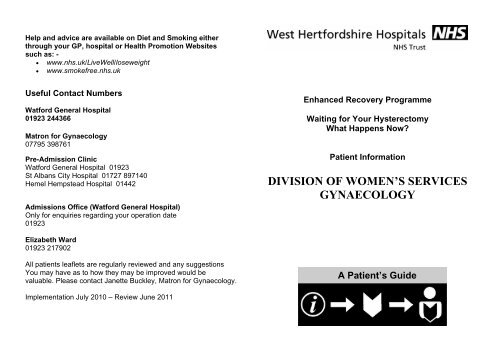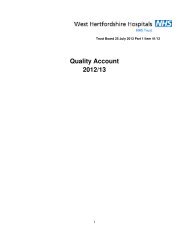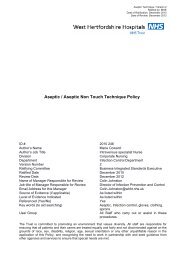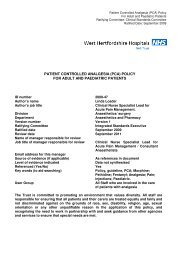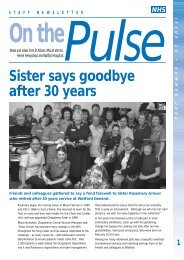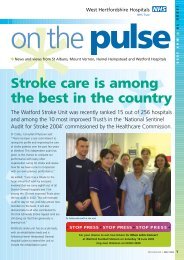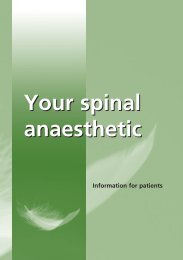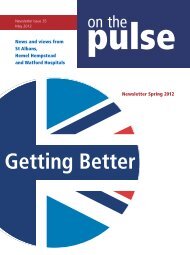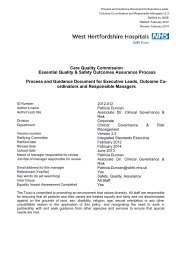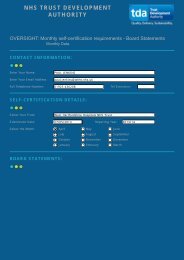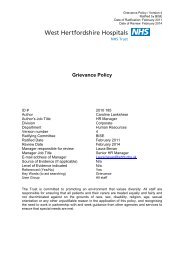Waiting for Your Hysterectomy - What Happens Now? - West ...
Waiting for Your Hysterectomy - What Happens Now? - West ...
Waiting for Your Hysterectomy - What Happens Now? - West ...
Create successful ePaper yourself
Turn your PDF publications into a flip-book with our unique Google optimized e-Paper software.
Help and advice are available on Diet and Smoking either<br />
through your GP, hospital or Health Promotion Websites<br />
such as: -<br />
• www.nhs.uk/LiveWell/loseweight<br />
• www.smokefree.nhs.uk<br />
Useful Contact Numbers<br />
Wat<strong>for</strong>d General Hospital<br />
01923 244366<br />
Matron <strong>for</strong> Gynaecology<br />
07795 398761<br />
Pre-Admission Clinic<br />
Wat<strong>for</strong>d General Hospital 01923<br />
St Albans City Hospital 01727 897140<br />
Hemel Hempstead Hospital 01442<br />
Admissions Office (Wat<strong>for</strong>d General Hospital)<br />
Only <strong>for</strong> enquiries regarding your operation date<br />
01923<br />
Enhanced Recovery Programme<br />
<strong>Waiting</strong> <strong>for</strong> <strong>Your</strong> <strong>Hysterectomy</strong><br />
<strong>What</strong> <strong>Happens</strong> <strong>Now</strong>?<br />
Patient In<strong>for</strong>mation<br />
DIVISION OF WOMEN’S SERVICES<br />
GYNAECOLOGY<br />
Elizabeth Ward<br />
01923 217902<br />
All patients leaflets are regularly reviewed and any suggestions<br />
You may have as to how they may be improved would be<br />
valuable. Please contact Janette Buckley, Matron <strong>for</strong> Gynaecology.<br />
A Patient’s Guide<br />
Implementation July 2010 – Review June 2011
You are now on the Gynaecology waiting list <strong>for</strong> a <strong>Hysterectomy</strong><br />
The aim of this booklet is to help you understand what the<br />
enhanced recovery programme means <strong>for</strong> you, and how you<br />
play an active role in your recovery.<br />
<strong>What</strong> is the Enhanced Recovery Programme?<br />
The aim of the Enhanced Recovery Programme is to get you<br />
back to full health as soon as possible after your operation.<br />
Research indicates that after surgery, the earlier we get you<br />
eating and drinking and out of bed, the quicker the recovery.<br />
This will speed up your recovery, making it less likely that<br />
complications will develop.<br />
In order to achieve this we need you to play an active part in<br />
your recovery and work together with us.<br />
Be<strong>for</strong>e <strong>Your</strong> Admission to Hospital<br />
You will be sent an appointment to attend the Pre Operative<br />
Assessment Clinic. You will also receive an invitation to attend the<br />
<strong>Hysterectomy</strong> Talk on Elizabeth Ward.<br />
<strong>Hysterectomy</strong> Talk<br />
The aim of the Talk is to in<strong>for</strong>m you of what will happen when you<br />
come into hospital <strong>for</strong> your procedure. Explaining what happens<br />
after your operation. This will be an opportunity <strong>for</strong> you to discuss<br />
any concerns either you or your relative/friend may have.<br />
Hospital Stay<br />
We aim <strong>for</strong> your stay in hospital to be 3 days. So as not to delay<br />
your discharge, preparation prior to admission is very important.<br />
The enhanced recovery programme has been set up to help with<br />
this preparation.<br />
<strong>What</strong> You Can Do To Help <strong>Your</strong>self<br />
Whilst waiting <strong>for</strong> surgery there are changes you may be able to<br />
make to improve your general health.<br />
• Diet- you will recover more quickly if you are healthy<br />
be<strong>for</strong>ehand. Try to eat a healthy diet in the time leading up to<br />
your operation. If you have any concerns about your diet,<br />
discuss them with your GP; you can be referred to a dietician<br />
if necessary. If you are overweight, it is very important to<br />
reduce your weight in preparation <strong>for</strong> your surgery. This will<br />
help to reduce any risks associated with anaesthetic and<br />
your new joint will last longer.<br />
• Smoking- smoking cigarettes will compromise healing after<br />
any surgery and make you more prone to infection. This is<br />
because smoking reduces the amount of oxygen being<br />
delivered to the tissues, which is vital <strong>for</strong> the healing<br />
process. It is best to try and stop smoking, at least 2 weeks<br />
be<strong>for</strong>e surgery and 6 weeks after, to give time <strong>for</strong> the wound<br />
and tissues around the joint to heal.<br />
• Exercises- stay active. Regular exercise will improve muscle<br />
tone, which can help to protect arthritic joints.<br />
Pre- Admission Clinic<br />
In this clinic an assessment will be made of your general fitness<br />
and investigations carried out, e.g. blood tests, blood pressure,<br />
ECG (heart tracing) and MRSA screening. You will receive further<br />
in<strong>for</strong>mation about this nearer the time.


